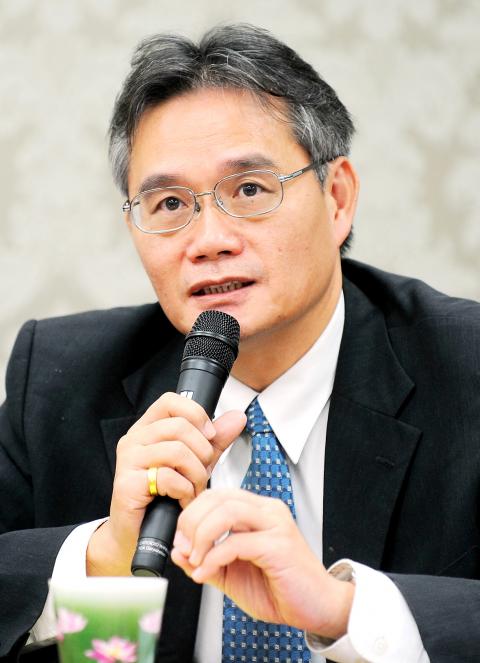|
Ma remarks could rule
out US intervention: academic
DANGEROUS WORDS: Ma’s framing of cross-strait
ties as not international could signal his intention to meet with Chinese
President Xi Jinping, the academic said
By Chen Hui-ping and Jake Chung / Staff reporter, with staff
writer

Wong Ming-hsien, director of
Tamkang University’s Graduate Institute of International Affairs and Strategic
Studies, talks to reporters on Feb. 4.
Photo: Lin Cheng-kung, Taipei Times
President Ma Ying-jeou’s (馬英九) statement
that cross-strait relations are “not international relations” during his Double
Ten National Day speech has further weakened Taiwan’s sovereignty and was meant
as a hint for the US and Japan not to interfere in cross-strait issues, a local
academic said.
“If by including such words in the National Day address Ma intends to make the
cross-strait issue an internal matter and not open to international
interference, it would cause serious repercussions in the days to come,” said
Wong Ming-hsien (翁明賢), director of Tamkang University’s Graduate Institute of
International Affairs and Strategic Studies.
Pointing to the fact that Taiwan is not a part of the UN, and the Ma
administration’s inclination to make the cross-strait issue an internal issue
rather than international, Wong said that in the event of a military conflict
over the Taiwan Strait, neither Japan nor the US would have grounds to
intervene.
Ma’s National Day address reflects his policy directions in the two years left
of his term, and Ma has to explain to the international community what he means
by “cross-strait relations are not international relations,” Wong said.
“Is it like the Basic Treaty signed in 1972 by the two Germanies, in which both
agreed that neither would have the right to represent the other in international
affairs, and that both would be able to participate in the UN, or is it an
attempt to clarify the relation of ‘on the island’ and ‘on the mainland,’ or is
it a shift away from his ‘no unification, no independence, no use of force’
policy and a nod toward unification, maybe even ‘to be unified?’” Wong asked,
adding that Ma has to make his intentions clear, both to Taiwanese and to the
international community.
That Ma would make such a declaration at a time when his approval ratings had
sunk as low as 9.2 percent perhaps shows his intention to pave the way for a
meeting with Chinese President Xi Jinping (習近平), Wong said, adding that Ma’s
rhetoric coincides with Xi’s comments during a meeting with former Chinese
Nationalist Party (KMT) chairman Wu Po-hsiung (吳伯雄) in June that both sides of
the Strait are Chinese by ethnicity (zhonghua minzu, 中華民族).
Wong said he believed Ma was attempting to trumpet his cross-strait policies to
draw attention from his lack of domestic accomplishments.
However, Ma’s “diplomatic accomplishments” in recent years, while superficially
creating the image of Taiwan being more active in international efforts, only
damaged Taiwan’s status as a sovereign nation, he said.
Diplomacy is an extension of a nation’s sovereignty, but the Ma administration
has set a bad example by asking for China’s agreement before applying to
participate in the World Health Assembly or the International Civil Aviation
Organization, Wong said, adding that the administration has caused Taiwan to
become a “diplomatic sub-entity” in the international community.
If non-governmental organizations in Taiwan were to follow such a precedent,
then “Taiwan would have no diplomacy to speak of,” Wong said, adding that with
the Ma administration’s weakening of national defense, Taiwan may not be far
from becoming the second Hong Kong or Macau.
Wong concluded with a warning that the Ma administration’s overtly pro-China
policies have already worried the US, adding that the stall in US-Taiwan arms
sales clearly shows that the US is standing back and observing.
|
![]()
![]()
![]()